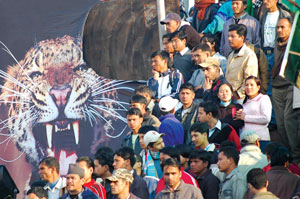|
|
| PREYING ON FEAR: A Maoist rally against King Gyanendra\'s Democracy Day speech on Monday attracted crowds of onlookers in Ratna Park. |
A nationwide opinion poll conducted last month by the research group Interdisciplinary Analysts shows that Nepalis still don't have much faith in politicians. Respondents were also found to be surprisingly ill-informed about the constituent assembly elections.
As in previous polls, the largest proportion of those polled were undecided about which political party they would vote for if elections were held. This time, many also didn't want to say who they'd vote for. Among those who had made up their minds, Maoist leader Pushpa Kamal Dahal is marginally more trusted than other leaders. Even so, support for the Maoists has eroded in the last six months.
As in a previous poll in October 2006, Nepalis are still divided on whether or not to keep the monarchy. Most of those who favour the monarchy want a ceremonial one but don't like Gyanendra as king.
Close to two-thirds of the respondents want to be identified as Nepali and not by their ethnic group, and almost the same number say Nepali should be the only national language.
Nepalis care most about the rights to equality, property, freedom of expression and the right to information. Republicanism, federalism, and secularism may be the most-heard slogans from political groupings but they are lower down on the agenda. The fate of the monarchy is rated as the least pressing constitutional issue. Affirmative action for women and dalits, and autonomy are deemed more important.
As the euphoria of the April Uprising dies down, Nepalis want the same things they always have: peace, development, livelihood
The Kathmandu-based research group Interdisciplinary Analysts (IDA) has conducted four public opinion surveys since December 2004. This one was conducted between 22 December-13 January among 2,011 respondents in 21 districts. The composition of the respondents is weighted to reflect national figures for caste, ethnicity, and geography.
More people have now heard of the constituent assembly elections (70 percent) than in earlier polls, but of those who have, only a third claim that they know what it means. When tested, only a quarter of these had a correct understanding of what the polls are for. Broken down, this means that just over five percent of respondents knew accurately what a constituent assembly is.
In addition, over 42 percent of respondents are uncertain about whether the elections can be free and fair, and one in five is convinced it is not possible. Close to half of those surveyed say the electoral process should be proportional.
Despite misgivings, over half of the respondents believe elections to the constituent assembly are essential as it is the only way to ensure 'lasting peace'. Only 22 percent of those see it as a necessity for formulating a new constitution, and 30 percent of all respondents believe the assembly should determine the fate of the monarchy.
Some political trends identified in Himalmedia, IDA, and NDI polls in recent years are intensified in this one. The August 2006 NDI poll showed 18 percent of those surveyed were not sure for whom they would vote. That figure in IDA's latest poll is up to 27 percent, with an additional 24 percent not wanting to tell. About the same low double-digit percentages say they would vote for the Maoists, the NC, and the UML as was reported in IDA's last poll in September 2006.
Nepali voters seem to trust the Maoists as much, or as little as, the other parties. But the popularity of all the parties has fallen since September, as the euphoria over People Power II evaporates and the promised changes recede. Nepalis want the 7+1 parties to deliver on three main issues: peace, development, and livelihood.
The future of the monarchy continues to be contentious, with Nepalis divided 50-50 about retaining or dismantling it. A Annapurna Post / Image Channel poll last week corroborates this polarisation.
Two in five respondents believe a referendum is the best way to determine the fate of the monarchy. Forty-one percent in support of a monarchy want it to be constitutional, just under half that would want a ceremonial monarchy and just under a quarter want an active king.
Surprisingly, the 1 February 2005 takeover is less of a reason for the erosion of the respect for monarchy than the royal massacre of June 2001, or the disposition of the current king. Those who believe Nepal should remain a kingdom and those who want a Hindu state (at 52 percent, three times the number who believe in secularism), cite 'tradition' as the main reason. Two-fifths of those who believe the monarchy has no role cite its \'feudal exploitative\' nature, and a quarter say it did not develop the country.
Because the interviews were done in December, the results of the poll perhaps do not reflect recent developments in the madhesi and pan-janajati movement. In response to one question, 43 percent say Nepal should be a federal rather than a unitary state. But this must be read in light of another finding that two-thirds of the respondents have never heard about the federal system.
For more details contact Interdisciplinary Analysts in Patan Dhoka at 5528111.
Given the current political situation, do you think the CA elections can be held by June 2007?
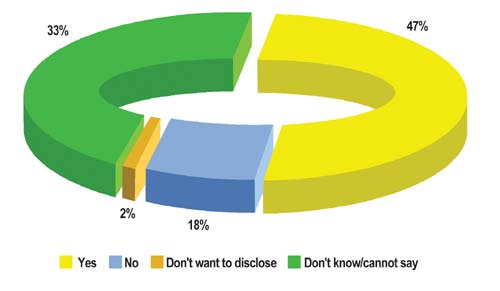
Do you think the constituent assembly elections will be free and fair?
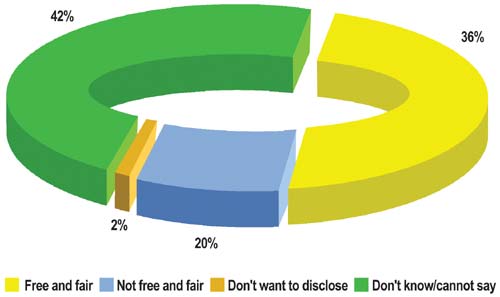
Should Nepal should remain a unitary state or should it become federal state?
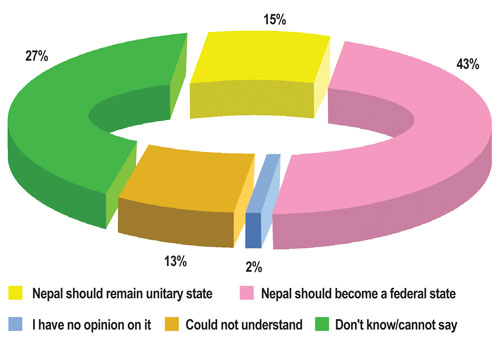
How do you like to identify yourself?
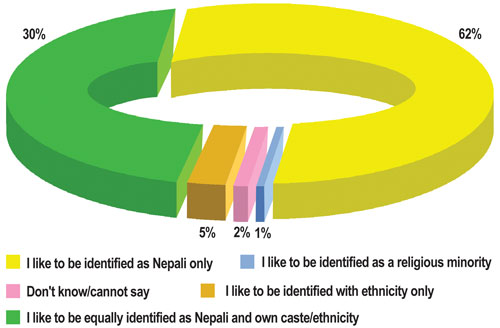
Level of trust towards the political parties
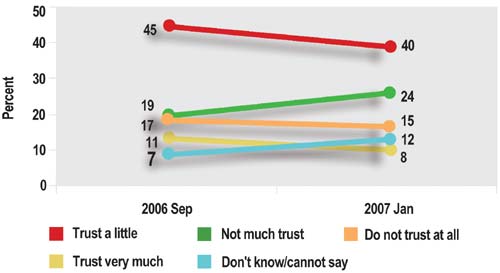
Level of trust towards the CPN (Maoist)
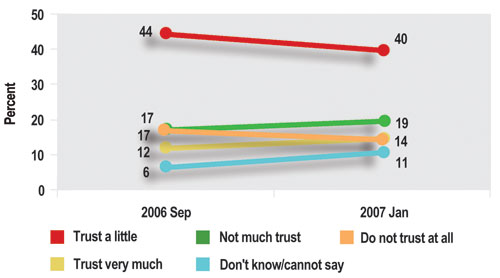
Rate your feelings towards these fundamental rights, 10 being very important, 1 not important, and 5 not particularly important or unimportant.

How important are these constitutional issues to you, 10 being very important, 1 not important, and 5 not particularly important or unimportant?

If elections to a constituent assembly were held today, who would you vote for?

Rate your feelings toward some leaders, 10 being very important, 1 not important, and 5 not particularly important or unimportant.


